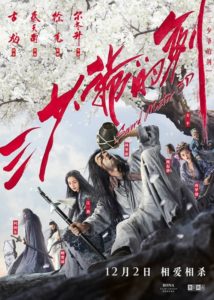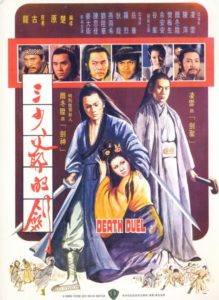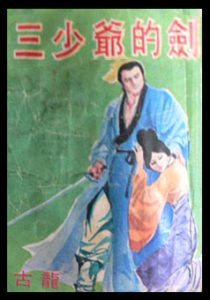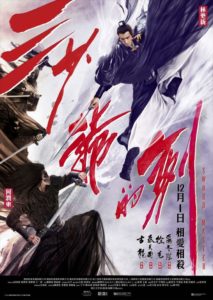Sword Master
三少爷的剑
Hong Kong/China, 2016, colour, 2.35:1, 3-D, 106 mins.
Director: Er Dongsheng 尔冬升 [Derek Yee].
Rating: 6/10.
Good-looking but undramatic version of the novel that spawned the entertaining Death Duel (1977).
Ancient China. Ambitious swordsman Yan Shisan (He Rundong) successfully defeats a man looking to avenge his younger brother’s death; but he still remains frustrated by always being compared unfavourably with Xie Xiaofeng (Lin Gengxin), aka San Shaoye (Third Young Master), the undisputed top swordsman in the martial-arts world. Murong Qiudi (Jiang Yiyan) hires Yan Shisan to kill Xie Xiaofeng, her childhood friend who humiliated her by walking away on their wedding day from a marriage that would have cemented ties between their two clans. Desperate to capture the martial-arts crown from Xie Xiaofeng, Yan Shisan eagerly accepts the assignment, but when he visits the Xie clan’s headquarters he’s told by clan leader Xie Wangsun (Xu Shaoqiang) that Xie Xiaofeng died 37 days ago; as a result, the clan is retiring from the martial-arts world. Murong Qiudi is devastated by the news; her faithful follower Zhu Yeqing (Gu Caobin), who’s always secretly loved her, sees it as his chance, but Murong  Qiudi rejects him as a suitor. In fact, Xie Xiaofeng is still alive and has chosen to retire into anonymity, working as a dogsbody at the brothel Seven Stars Pool in Kuhai township, under the name Ji, nicknamed Useless Ji. After standing up for one of the courtesans, Wawa (Jiang Mengjie), against two clients who refuse to pay, Xie Xiaofeng is wounded; Wawa looks after him when he’s recovering but he decides to leave town. A friendly villager, Miaozi (Ma Jingjing), who lives with his mother (Bao Qijing), lets him stay at his house; he turns out to be the elder brother of Wawa, who moves back home after a bruising encounter with one brothel client (Zhou Peng). When the brothel tries to get her back, it runs up against Yan Shisan, who has now decided to use his martial-arts skills only for good. Not realising who he is, Yan Shisan also teaches Xie Xiaofeng his secrets. Then Murong Qiudi, who’s discovered Xie Xiaofeng is still alive, turns up and demands he comes back. Despite his liking for Wawa, Xie Xiaofeng complies, and only after he’s gone does Yan Shisan discover who Ji really was. A clan war, triggered by Murong Qiudi, looms.
Qiudi rejects him as a suitor. In fact, Xie Xiaofeng is still alive and has chosen to retire into anonymity, working as a dogsbody at the brothel Seven Stars Pool in Kuhai township, under the name Ji, nicknamed Useless Ji. After standing up for one of the courtesans, Wawa (Jiang Mengjie), against two clients who refuse to pay, Xie Xiaofeng is wounded; Wawa looks after him when he’s recovering but he decides to leave town. A friendly villager, Miaozi (Ma Jingjing), who lives with his mother (Bao Qijing), lets him stay at his house; he turns out to be the elder brother of Wawa, who moves back home after a bruising encounter with one brothel client (Zhou Peng). When the brothel tries to get her back, it runs up against Yan Shisan, who has now decided to use his martial-arts skills only for good. Not realising who he is, Yan Shisan also teaches Xie Xiaofeng his secrets. Then Murong Qiudi, who’s discovered Xie Xiaofeng is still alive, turns up and demands he comes back. Despite his liking for Wawa, Xie Xiaofeng complies, and only after he’s gone does Yan Shisan discover who Ji really was. A clan war, triggered by Murong Qiudi, looms.
REVIEW
Hong Kong film-maker Er Dongsheng 尔冬升 [Derek Yee] turns the clock back almost 40 years with a new version of the novel that spawned Death Duel 三少爷的剑 (1977), the swordplay movie that gave him his first starring role as a contract actor at Shaw Brothers. Er’s first costume martial-arts film as a director, Sword Master 三少爷的剑 is marginally more faithful to its source novel – the tale of a young swordmaster who yearns for anonymity – and it looks much slicker and even has some basic psychology to its characters. But it’s undercut by wooden playing in the title role from China’s Lin Gengxin 林更新 and by not knowing what it is itself – a knowing, post-modern remake, a tribute to classic Shaw Brothers swordplay films of the 1960s and 1970s, or a bit of both.
The whole Chinese-language film industry has undergone a revolution since the days of Death Duel, and Sword Master reflects the changes: nowadays the big money and most of the stars come from the Mainland, 3-D and elaborate visual effects are the norms for high-profile productions like this, and the Hong Kong studio system that gave birth to Death Duel is dead and buried. But Sword Master ends up as a curiously Janus-like production, looking backwards as well as forwards – hardly surprising given the histories of Er, 59, who came out of the old system and producer/co-writer Xu Ke 徐克 [Tsui Hark], 66, who grew up during it. Despite some colourful playing by Mainland actress Jiang Yiyan 江一燕 and Taiwan American actor-singer He Rundong 何润东 [Peter Ho] as the other leads, Sword Master is much less fun than the 1977 version.
 Death Duel was the sixth in a cycle of 12 films (1976-79) based on the novels of Hong Kong-born, Taiwan-raised author Gu Long 古龙 (1938-85), pen name of Xiong Yaohua 熊耀华. One of the three major wuxia novelists of the post-WW2 era, along with Jin Yong 金庸 (1924- ) and Liang Yusheng 梁羽生 (1926-2009), Gu Long was then – like Shaw Brothers – in the last hurrah of a long career. All 12 films were directed by the experienced Chu Yuan 楚原 and showcased Shaw Brothers’ factory style, with its roster of stars, colourful production design, and a studio-bound, make-believe look. Often very freely adapted from Gu Long’s novels, the stories of multiple betrayals and trap-door plot reversals reinvigorated Hong Kong cinema as it groped for an identity in the period between the death of Bruce Lee and the forthcoming rise of the more mercurial Cheng Long 成龙 [Jackie Chan].
Death Duel was the sixth in a cycle of 12 films (1976-79) based on the novels of Hong Kong-born, Taiwan-raised author Gu Long 古龙 (1938-85), pen name of Xiong Yaohua 熊耀华. One of the three major wuxia novelists of the post-WW2 era, along with Jin Yong 金庸 (1924- ) and Liang Yusheng 梁羽生 (1926-2009), Gu Long was then – like Shaw Brothers – in the last hurrah of a long career. All 12 films were directed by the experienced Chu Yuan 楚原 and showcased Shaw Brothers’ factory style, with its roster of stars, colourful production design, and a studio-bound, make-believe look. Often very freely adapted from Gu Long’s novels, the stories of multiple betrayals and trap-door plot reversals reinvigorated Hong Kong cinema as it groped for an identity in the period between the death of Bruce Lee and the forthcoming rise of the more mercurial Cheng Long 成龙 [Jackie Chan].
 Gu Long’s novels were very different from the more literary works of Jin Yong and Liang – spare, pithy, often satirical – and the source novel for Death Duel, 三少爷的剑 (literally, “Third Young Master’s Sword”), serialised from 1975 and published in 1976, was one of his most notable riffs on the genre. Chu’s films manufactured a special style for the adaptations, constantly renewing itself from film to film. Death Duel, for instance, almost totally lacked, say, the stygian look of The Magic Blade 天涯•明月•刀 (1976) or the extrovert, fantastique qualities of Clans of Intrigue 楚留香 (1977), the second and fourth in the cycle. While remaining within the same general boundaries, it had a more downbeat quality – a sad, wistful atmosphere and a nostalgia for greater times when real heroes walked the land.
Gu Long’s novels were very different from the more literary works of Jin Yong and Liang – spare, pithy, often satirical – and the source novel for Death Duel, 三少爷的剑 (literally, “Third Young Master’s Sword”), serialised from 1975 and published in 1976, was one of his most notable riffs on the genre. Chu’s films manufactured a special style for the adaptations, constantly renewing itself from film to film. Death Duel, for instance, almost totally lacked, say, the stygian look of The Magic Blade 天涯•明月•刀 (1976) or the extrovert, fantastique qualities of Clans of Intrigue 楚留香 (1977), the second and fourth in the cycle. While remaining within the same general boundaries, it had a more downbeat quality – a sad, wistful atmosphere and a nostalgia for greater times when real heroes walked the land.
All of this fitted with the novel’s themes of (a) the merits of anonymity in a violent world, and (b) the illusory nature of that anonymity. The peace which champion swordsman Xie Xiaofeng yearns for, by quitting the martial-arts world and working as a dogsbody in a high-class brothel, is unattainable, as his vengeful former fiancee and an ambitious swordsman both seek him out. Like a samurai, a gunfighter, or even a spy, retirement isn’t an option. Sword Master preserves these themes – at least on the page – but they’re not given much dramatic heft, either by the art direction (which shifts between stylised studio landscapes that partly recall Chu’s cycle, and realistic village and temple sets), the music (the score by prolific Hong Kong composer Jin Peida 金培达 [Peter Kam] is especially lame) or any overall atmosphere (of which there’s very little after the opening 10 minutes).
Ironically, the one thing that Death Duel and Sword Master both have in common is a colourless lead. Despite being cast in multiple swordplay movies, Er, who’s a half-brother of Shaws star Jiang Dawei 姜大卫 [David Chiang], always lacked charisma as an actor, and wisely moved into directing in the mid-1980s; maybe to compensate for this, Death Duel relied on (often comic) cameos by big names, including Jiang as a martial artist who’s gone insane through over-training. In Sword Master, the playful performances by He (complete with cobweb facial tattoos) and Jiang Mengjie 蒋梦婕, plus the intensity of Jiang Yiyan as the hero’s spurned lover, are some compensation but they never really make up for Lin’s uncharismatic lead and the lack of focus and organic development in the script by Er, Xu and Hong Kong’s Qin Tiannan 秦天南, a regular Er collaborator. A film that should have a strong moral core, Sword Master ends up with no core at all – something that, unlike in Death Duel, no number of cameos can compensate for.
Lin’s flat performance is even more of a mystery after his okay showings in Xu’s Young Detective Dee: Rise of the Sea Dragon 狄仁杰之神都龙王 (2013), and in rom-com My Old Classmate 同桌的妳 (2014). Jiang brings a steely intensity to her role of the spurned fiancee, and a brief poignancy to her final scene, but isn’t allowed to develop the role much. Dominating the film is He, a suitably big personality in a big role, carrying around his own gravestone like some crazed version of Django. Among others, perky TV actress Jiang Mengjie, 27, is better in her earlier scenes as a gold-digging courtesan, while among the cameos by veterans Hong Kong’s Xu Shaoqiang 徐少强 [Tsui Siu-keung], 61, who played a swordsman in Death Duel, brings some weight to the leader of the Xie clan.
A note at the end of the film states that “this film is based on Death Duel by Celestial Pictures” – the company that owns the rights to the Shaw Brothers’ library – which any cursory comparison shows is hardly the case. Shot across the summer of 2014 in Hengdian Studios, south of Shanghai, the film has good visual effects that enhance rather than overwhelm the story, but only so-so martial-arts action by Hong Kong’s Yuan Bin 元彬 (a Xu regular) and Lin Di’an 林迪安 [Dion Lam] (League of Gods 封神传奇, 2016). Mainland box-office was RMB101 million, poor for a production of this kind.
For the record, there’s been two TV drama series based on the novel: a 1977 Hong Kong one, with Wan Ziliang 万梓良 [Alex Man], Xu Shaoqiang 徐少强 and Liu Yinghong 柳影虹, directed by Liang Weimin 梁伟民, and a much longer 2001 Mainland one, with He Zhonghua 何中华 and Yu Feihong 俞飞鸿, directed by Jin Demao 靳德茂.
CREDITS
Presented by Bona Film Group (CN), Bona Entertainment (HK), Wanda Media (CN), Zhejiang Puhua Tianqin Investment (CN), Shanghai Bona Media (CN), Xinjiang Bona Runze Media (CN). Produced by Film Unlimited (HK).
Script: Qin Tiannan, Xu Ke [Tsui Hark], Er Dongsheng [Derek Yee]. Photography: Chen Weinian, Chen Zhiying. Editing: Xu Hongyu [Derek Hui], Li Ruiliang. Music: Jin Peida [Peter Kam]. Art direction: Zhang Shihong [Silver Cheung], Li Qingyu, Wu Zhen, Zhuang Guorong. Styling: Zhang Shihong [Silver Cheung]. Sound: Guo Xiaoshi, Zeng Jingxiang [Kinson Tsang], Li Yaoqiang, Yao Junxuan, Li Zhixiong. Action: Yuan Bin, Lin Di’an [Dion Lam]. Visual effects: Jeong Sung-jin, Bak Jun-yeong (Dexter Digital, Mofac & Alfred Creative Studios). 3-D: Zhang Jianlong, Cui Xiaoyi.
Cast: Lin Gengxin (Xie Xiaofeng/San Shaoye/Ji), Jiang Yiyan (Murong Qiudi), Jiang Mengjie (Wawa/Xiaoli), He Rundong [Peter Ho] (Yan Shisan), Bao Qijing [Paw Hee-ching] (Miaozi’s mother), Gu Caobin (Zhu Yeqing/Tian Zun), Ma Jingjing (Miaozi), Xu Shaoqiang (Xie Wangsun), Gu Guanzhong (Murong Zheng), Wu Yuanjun (Xie clan elder), Lu Jianming [Jamie Luk] (Xia Houxing’s father), Fang Ping (big boss in brothel), Harashima Daichi (young adult Xie Xiaofeng), Tie Nan (Gao Tong), Lin Chaoxu (Wu Ya/Crow), Lin Chen (Seven Stars’ servant girl), Tong Zhongqi (Tiexue Zhangmen), Tian Miao (Han, brothel manageress), Kou Jun (Gui Gong/Mr. Turtle, her sidekick), Zhang Xiaomi (courtesan in backyard), Guo Jiulong (Buddhist monk), Wang Deshun (Yao Shan Shen/Medicine Mountain God), Liu Guangchao (wine-seller with cart), Wu You (gravekeeper), Bao Xiaoping, Yang Wei (unruly brothel clients), Wang Zhao (Wang Zhao, young swordsman), Zhou Peng (brothel client with whip), Lai Jiatong (Wu Ming/No Name), Zhao Haiying (tombstone-shop owner), Wei Xiaodong (Sanjiao Yan/Triangle Eyes), Chen Moyan (young Xie Xiaofeng), Zhang Ziyu (young Murong Qiudi), Song Yiren (young adult Murong Qiudi), Ma Ruihan (young adult Zhu Yeqing), Shen Kai (Xia Houxing), Hong Mu (Murong Qiudi’s mother).
Premiere: Rome Film Festival, 20 Oct 2016.
Release: Hong Kong, 1 Dec 2016; China, 2 Dec 2016.
